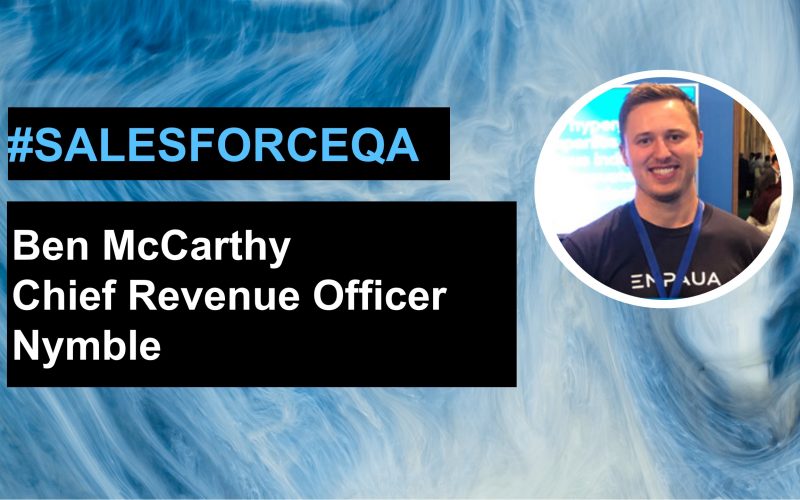We recently spoke with Ben McCarthy, Chief Revenue Officer at Nymble and founder of the world’s most popular Salesforce blog – Salesforce Ben – who shared his thoughts on how Salesforce is driving digital transformation efforts, and how businesses and professionals alike need to adapt in order to futureproof and take advantage of these changes.
Third Republic (TR): Can you start by giving us an overview of how you were immersed into the Salesforce ecosystem?
Ben McCarthy (BM): I started in the Salesforce world pretty much straight out of university. Having graduated with an Information Systems degree, I joined a Consultancy firm as an Assistant Consultant, and learnt a lot about the basics of Salesforce before moving on and becoming the CRM Manager for Smoothwall, where I was the sole administrator for Sales Cloud and Service Cloud and supported over 120 users across 4 different countries.
I then made the move to Conga where I worked as a Business Analyst again for about a year; here I was mainly talking people through the journey of Salesforce and demoing and building out the solution for clients. I then made the decision to move back into the core of Salesforce as my work as Conga focused more on working with applications. I then joined EMPAUA where I help to establish the London office as Managing Director for the UK. My role is mainly focussed on Sales and developing the relationship with Salesforce.
TR: And Salesforce Ben – now the number one Salesforce blog in the world! – what was the impetus behind starting the blog, and did you expect it to grow into what it has?
BM: To be honest I initially started the blog for myself as I noticed that, being an admin, you often have to find a lot of work arounds and hacks, so it was mainly a place for myself to write down everything I found. I made the decision to take it public so that I would be able to reference it easily, and then I realised that there actually wasn’t any single blog out there that catered to a wide variety of Salesforce topics; there were those specifically for admins or administrators but none of them incorporated general news or career information.
So, it kind of grew from there when I realised that there was a space in the ecosystem for a blog that covered everything to do with Salesforce, and it just began to gain traction over the years because it was filling this need.
TR: You’ve clearly worked across the Salesforce platform for a while and in a few different capacities. How has the Salesforce world changed over this time?
BM: So much has changed really. Most notably is probably the variety of products and specialisations that Salesforce now has; when I started, Salesforce had only just acquired the marketing cloud and now there is a huge variety in products that complete the journey from prospect to customer.
TR: With the growth that you’ve already seen, what up and coming Salesforce products are you most excited about, and why?
BM: The main ones are probably Einstein and Integration Cloud. Einstein probably for obvious reasons; even though I have not had the chance to play around with it – I’m really looking forward to trying it out. I think we’ll see it on the same trajectory as Pardot and Marketing Cloud in that it will take a while for it to settle in and be used, but then it will accelerate quickly. I’m really looking forward to seeing how our customers can act with it, but also what it will tell us about our own data internally.
I think the Integration Cloud and MuleSoft acquisition is also really exciting. It feels like there has always been a piece of the puzzle missing whenever you would talk about integration and backend systems and it just wasn’t a feature that Salesforce could offer. It’ll be great to be able to push that offering to our customers and give them a complete, end-to-end solution from Salesforce.
TR: How do you see Salesforce fitting into the era of digitalisation and digital transformation?
BM: When people talk about digital transformation and moving away from legacy systems on onto new cloud-based systems, I think Salesforce is pretty much at the centre of it all.
For instance, we’ve done implementations for larger customers in the past who have actively use Salesforce at the heart of their strategy; they come to realise that the platform is more than a glorified phonebook and that they can affect their whole business with it. A lot of customers only see it in a limited capacity, but it is so much more powerful than just being a simple database and – with all of the extra products like Pardot coming into the mix – I don’t think that there’s many other companies who do offer this end-to-end transformation product.
TR: Surely, with the rate at which the digital world is advancing, and digital transformation is occurring, there is now a real threat to businesses who can’t keep up that they will become irrelevant?
It’s a funny one because it definitely is a worry, and if you’re one of those slower paced businesses then you should be concerned, but like it or not that’s the industry and the world that we’re in.
People are constantly talking about how prominent change is in today’s society, so if you don’t keep up with innovation then you’re only going to move backwards. It’s not nice to think, but those organisations who are slower will be brushed aside and that’s the reality now, so companies are going to have to continue to innovate and change if they want to keep up.
TR: With Salesforce and software at the core of these transformations, what would your advice be to businesses who are looking to keep up with this ever-evolving technological and digital landscape?
BM: You need to strategise and work out where your business is, and where it is going to be. Do a gap analysis on all your systems – including Salesforce – and the results of this will make it clear where in the future you won’t be able to keep up with rapid changes.
Think of it like this: if you tripled in size, which systems wouldn’t be able to keep up? Those are the ones you should address to future-proof your business.
TR: And in this rapidly changing and increasingly digital world, aren’t Salesforce professionals at risk? What advice do you have to overcome these challenges?
BM: It’s hard and it’s something I can definitely relate to because the fact that things move so quickly is a real challenge. But as long as you keep up – doing things like Trailhead and reading blogs and following those on the forefront of the industry – then you can keep ahead of the curve on a lot of things. Combining attending user groups, doing Trailhead, reading blogs and going to events is a great way to keep yourself on top of the Salesforce ecosystem.
I also think it presents an opportunity; one of the things I’ve always measured myself on in my career is how much I’m progressing and the times I’ve moved jobs is because I’ve felt like I’m slowing down.
It should be ringing alarm bells if you’re coming into work and you’re not learning as much or as quickly as you used to. So, with the rate at which the digital world and Salesforce is changing it does present a chance for you to make these changes and keep yourself moving forwards and always learning.
TR: Do you perceive there to be a skills gap in the Salesforce world?
BM: Salesforce is the only market I have known, so I can’t compare, but from what I’ve seen – definitely. I know for a fact that every consultancy firm has a job advertisement for consultants, and that’s saying something; one of the only reason why these consultancies aren’t growing is because of these skills shortages and I can definitely relate to these challenges. So yes, I agree there definitely is one and there has been for a while.
TR: If it’s such a struggle, how can businesses look to fill their Salesforce skills gap?
BM: Speaking for consultancies specifically I think there needs to be a focus on hiring more junior team members and training them up. Salesforce is a demanding industry but as a system it is relatively easy to configure and to learn.
That’s not saying it’s easy to be a consultant because this takes years of experience, but junior hires can bring almost impact to a consultancy – or any business really – because they can pick up the base skills quickly and actively contribute to the business in a short space of time. Then it’s just a matter of training them on the more complex skills and giving them the opportunity to gain the necessary experience.
TR: And do you think the responsibility is also on Salesforce professionals to close this skills gap?
BM: I think those in the market can do a lot more to increase awareness about Salesforce and the opportunities that it can offer; I think if more people knew more about it then they would jump at the chance to get involved.
There are a lot of courses and people trying to encourage the uptake of Salesforce – for instance Pep Up Tech in America are encouraging underrepresented individuals to learn about Salesforce and are upskilling them to use the system. This is great news, but I think the impetus also needs to come from professionals to raise awareness and encourage people into the ecosystem.
TR: And, with the changes we are seeing, do you think professionals now need different skills to be successful?
BM: 100% soft skills are becoming more and more important. There has always been a cliché that you don’t need to them work in IT. But, systems are becoming so much easier to configure – 10 or 20 years ago you needed code for everything and now Salesforce have created clicks not code and this is driving almost all the aspects of the system where you actually don’t need to be a developer.
This means even though it will always be relatively complex, and you will need technical skills, and soft skills will become even more important because you need to be able to have emotional intelligence, and digest business needs, and do thinks outside of just working on the technical aspects of the system.
Demonstrating this, I recently heard a TED Talk by the CEO of Bluewolf who was saying that humanitarian studies are becoming more important than ever simply because systems are becoming easier to configure, and those people that know about emotional intelligence and these are better on the softer side of skills are becoming more important to businesses – and these humanitarian courses place more of an emphasis on these communication skills than other courses.
TR: We’ve discussed how rapidly Salesforce and the digital world is changing, and the challenge the presents to both businesses and professionals trying to keep up. How do you think this affects those outside of the ecosystem – such as recruiters and internal resourcers?
BM: I think recruiters now need a really good understanding of the system because they already have a hard time filling a Salesforce role, and this will only get more difficult as the ecosystem changes and grows.
However, they’re in a great position to put on events, or write about the industry, to show that they’re also on the forefront of Salesforce, and to demonstrate to clients that they should be implementing Salesforce in order to help accelerate their business growth. Essentially, they’re in a good position but they have to use their information and keep on top of the changes just as professionals and businesses do.
TR: Finally, looking back at everything you’ve achieved, if you could give yourself some advice when you first started your Salesforce journey, what would you say?
BM: I would tell myself to get involved in the wider community sooner. I’ve been lucky in that, with my position with my blog I’ve managed to meet a lot of people and build up a great network, but there’s no harm in doing that a lot sooner.
I think that if people are really looking to progress their career they should be attending MeetUps, User Groups, Salesforce World Tour – really anything that gives them the opportunity to network. Networking definitely can’t be done in isolation and you need to work to build out technical skills, but it can definitely help you out massively, so I would tell my younger self to start doing it sooner!


